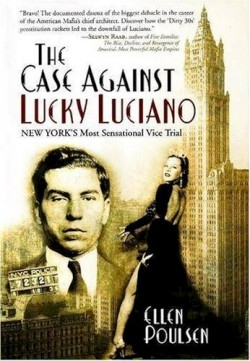The Case Against Lucky Luciano
New York's Most Sensational Vice Trial
When notorious mob boss Charles “Lucky” Luciano was arrested on vice charges, his first thought was of the hit his “tough-guy” image would take. “Prostitution?” he lamented, “I’d rather be tried for murder.”
Despite his preference, Luciano’s legacy will always be tied to the Depression-era New York City prostitution racket—from the hookers, “bookers” (who recruited the girls) and madams to the cops, attorneys, and judges, all begrimed by the dirty fingers of organized crime.
At the heart of this book is the 1936 vice trial of “Charlie Lucky” Luciano, the inveterate gambler and reputed head of the prostitution syndicate in New York City; but his story has been told elsewhere. Instead, the author explores the myriad of minor players whom Luciano exploited, with an emphasis on the women forced into his syndicate. From the squandered lives of young, even beautiful women like Nancy Presser, a small town girl corrupted by the Big Apple, to Jennie “The Factory” Fischer, and the other hardened madams running $1 and $2 houses, Poulsen culls a compelling tale of lives ruined by illicit drugs, sex and violence.
In juxtaposing the crusading Special Prosecutor Thomas Dewey with such colorful mobsters as Louis “The Dove” Traube, Al “Cockeyed Louie” Weiner, and “Tommy the Bull” Pennochio, Poulsen imbues her powerful writing with incredibly stark verisimilitude. The many black and white photographs and mug shots of her subjects help the reader connect with them and begin to understand their motivations, worries, and fears. For example, the reader can sense the feeling of pride which must have underlaid one prostitute’s testimony that she once worked at “a $3 house.” Like most of the women chronicled, she did not seem to be ashamed of the way she earned her living.
This is not Poulsen’s first foray into reporting from this era. She has a bachelor’s in English Literature from Queens College-CUNY and is the author of Don’t Call Us Molls: Women of the John Dillinger Gang. She has appeared on the Discovery Channel and lectures extensively on the subject of 1930s crime and law enforcement.
Poulsen has crafted an exhaustively-researched criminal saga. Her research into events which occurred more than seventy years ago pays off with such tidbits as a photograph of the postcard sent from Mexico by one of the prostitute witnesses in Luciano’s trial to an assistant prosecutor. Explaining that the postcard sender had fled the long arm of the mob to Juarez, Mexico, “where the dope was cheap and plentiful,” Poulsen deftly summarizes the fate about to befall the famed “Cokey Flo” Brown: “The missive, with its funny little picture and faded postmark, was the last of her letters home.”
Luciano’s Mafia infamy may have lived on after his death in 1962, but The Case Against Lucky Luciano gives voice to Cokey Flo and the many others he victimized decades earlier. Poulsen’s artful rendering leaves no doubt that their stories have long deserved to be told.
Reviewed by
Alan J. Couture
Disclosure: This article is not an endorsement, but a review. The publisher of this book provided free copies of the book to have their book reviewed by a professional reviewer. No fee was paid by the publisher for this review. Foreword Reviews only recommends books that we love. Foreword Magazine, Inc. is disclosing this in accordance with the Federal Trade Commission’s 16 CFR, Part 255.

